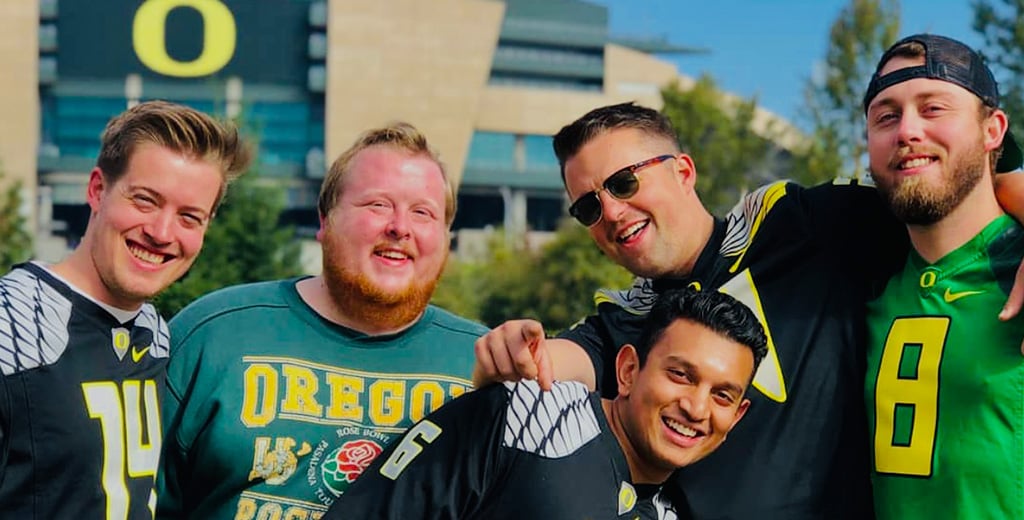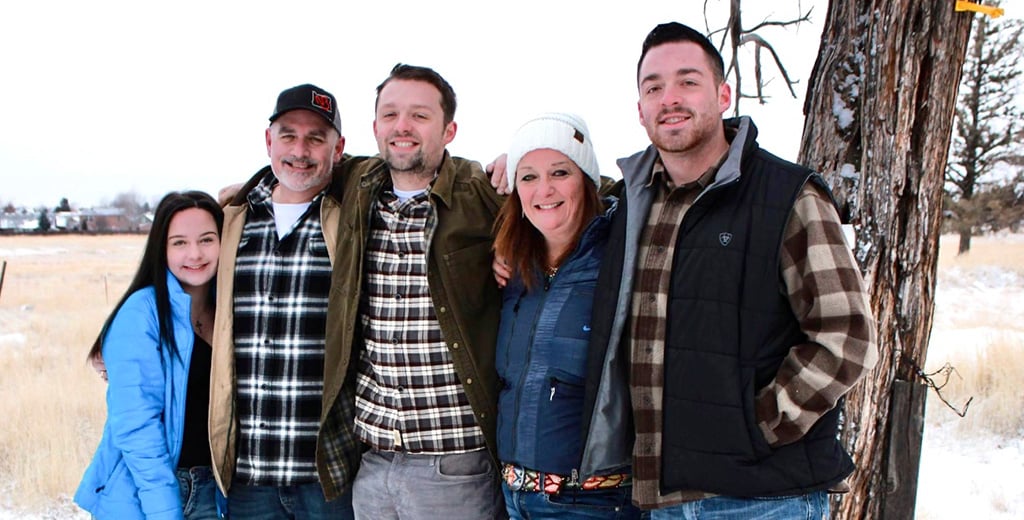
Kiefer Leutschaft at Tumalo Falls in Tumalo, OR. Photo courtesy of the Leutschaft Family.
Son's death spurs family to share their story of suicide to help others
Kiefer Leutschaft was practically a Duck before he was even born. Raised by a family of University of Oregon graduates, he attended his first football game when he was just a few weeks old.
He was a loving, thoughtful, goofy, sweet, smart, kind person who loved music and festivals and being lost in a crowd at a football game. He was raised in a loving, close-knit, middle-class family of two parents who are still married, and a younger brother and sister.
In high school and college, he had great groups of close friends, but after graduating in 2017 with a degree in economics, his parents, Brian and Julie Leutschaft, said his mental health began to decline.
Graduating from college can be one of the most exciting times in your life, but what comes next can also be daunting for young adults, especially if they are not on a career path that’s meaningful to them, which Julie said was the case for her son.
“He just wasn’t thriving. He wasn’t engaging,” she said. “He was doing the bare minimum to pay his bills, but wasn’t really engaging in life, which was so different from the kid we knew.”
After college, he was diagnosed with general anxiety, major depression, and also learned he was on the autism spectrum. He moved in and out of his parents’ home in Redmond between attempts to establish his adult life but could never keep a job very long.
When the pandemic hit, his mental anguish compounded, but his parents said he didn’t know how to talk about his emotions and did not let others know how much he suffered.
On October 3, 2021, Kiefer shared his final moments in his family home with his sister by his side. He was 26 years old.
“Our lives are forever changed,” Kiefer’s father, Brian, said. “There isn't a day or hour that we don't think of Kiefer. We will do our best to honor Kiefer, our family, and ourselves by reaching out and helping those around us in need.”
While still deeply grieving his shocking loss, his family and some friends have decided to keep his legacy alive by raising funds for treatment and encouraging everyone to talk about mental wellness.
“We do not have control over the length of people’s lives but we do have control of how we interact with them while they are alive by reaching out to enrich their lives with kindness, love, and compassion. We just do not know what people are going through.”
On what would have been Kiefer’s 27th birthday, April 1, 2022, they hosted their first major fundraiser to help more people live fulfilling lives, and they plan to make it an annual event. In the inaugural year, they raised approximately $31,000 for an endowment fund that will help people afford treatment at Rimrock Trails, a mental health facility in Central Oregon.
Kiefer had health insurance and had tried to find medications and counseling that would help him, but his parents said he eventually succumbed to his illness.
“We do not have control over the length of people’s lives but we do have control of how we interact with them while they are alive by reaching out to enrich their lives with kindness, love, and compassion,” Kiefer’s father said. “We just do not know what people are going through.”
Building a support system
John Seeley, a professor in the Special Education and Clinical Sciences department with the UO College of Education, knows firsthand the pain of losing someone to suicide. His father’s suicide when he was 18 years-old was a motivating factor for his career and research on suicide prevention. He received his doctorate in special education, master’s in psychology, community health, and decision science, and undergraduate degree in political science from the UO.
Today, he is a core faculty member in the Prevention Science program. However, because of shame and stigma, at first, it was hard for Seeley to tell his story.
“I realized, if I don't talk about it and start addressing the stigma, who can and who will?” he said.
Aside from depression and anxiety, Seeley says the strongest signs someone might be contemplating suicide is ruminating thoughts on their worthlessness, withdrawal behavior, and “not engaging in activities they used to enjoy.”
Kiefer Leutschaft (second from right) with Nolan Tonkyn, Jack Bischman, Kyle Cleric, and Vince Thomas (front), in front of Autzen before a football game. Photo courtesy of the Leutschaft Family.
In Kiefer’s case, the pandemic forced some of that withdrawal, and the amount of time he spent on social media became a problem for him, his father said.
Kiefer’s Chi Psi fraternity brother and former roommate Vince Thomas also knew social media was a problem for his friend, especially comparing his life to how great he perceived the lives of others to be.
About two weeks before Kiefer’s death, Thomas had been planning a trip to Denver, Colorado for his birthday, and Kiefer backed out, citing concerns over money.
Kiefer’s parents had traveled to Palo Alto for the Duck football game against Stanford, and tailgated with Thomas’s family on that trip, but Kiefer didn’t travel for the game.
The next morning, he was gone.
In April, Thomas ran the Eugene Marathon in his friend’s honor and raised nearly $9,000 for Rimrock Trails through the marathon’s Run for a Reason program, which raises funds for local and national charities. Thomas’ efforts brought the total raised in Kiefer’s name to close to $40,000.
Thomas says Kiefer’s death “made me appreciate how you never know what people are going through.” If he had known his friend was struggling to that extent, he would have tried to help.
Seeley, who is also a senior research scientist at the Oregon Research Institute, says that he conducts training for who he calls “gatekeepers”—UO residential hall monitors and friends—on how to approach the topic with others, but the bottom line is that it’s okay to ask directly if the person is thinking about suicide when you see signs of depression.
“There’s been a lot of research that demonstrates asking about it has not increased the risk,” Seeley said. “You should ask the question, and a lot of times it’s very cathartic for the individual to share.”
Kiefer’s mother Julie wants folks to connect earlier before it’s gotten to the point of suicidal ideation. She said asking questions beyond “How are you?” to get people talking could end up being important to helping someone get on a healthier path. “Have you eaten?” and “Are you sleeping well?” might get someone talking and help indicate to loved ones if there are bigger issues that need attention, she said.
“When my husband and I were trying to help Kiefer with his mental health, we felt very isolated,” she said. “We felt like we couldn’t go to our friends and say, ‘Oh, Kiefer’s really suffering.’”
If we, as a society, work to open up the conversation around mental health, people won’t feel like they have to hide it when they are not well, and the hope is that will lead to more people getting the help they need before it’s too late, she said.
“If someone has cancer or a broken leg or a stroke, people are rallying to the cause, but it’s still not okay to talk about mental illness,” she said. “We’re not going to leave suicide or mental health in the closet.”
Leutschaft Family photo in Redmond, OR – Adi, Brian, Kiefer, Julie, & Colin. Photo courtesy of the Leutschaft Family.
University of Oregon Health Services provides a variety of mental health services for UO students, faculty, and staff. If you are thinking about suicide, call the Counseling Services After-Hours Support and Crisis Line at 541-346-3227 or the National Suicide Prevention Lifeline 1-800-273-TALK (8255) now. Or text "OREGON" to 741-741.
- By Serena Markstrom, BA ’03 (magazine), freelancer for the UO Alumni Association
Related articles
Project demonstrates student mental health support system
Study finds worker-friendly scheduling boosts bottom line
Study looks at smartphones and their effect on mental health
President Schill marks Mental Health Awareness Month
President Schill On The Ballmer Institute for Children’s Behavioral Health

